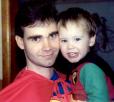|
If you enjoy this email service, I encourage you to spread the word to family and friends that we may bring inspiration to the lives of many! If you are not on the list and this has been passed along to you, join the thousands of world-wide readers by visiting: http://www.HeartTouchers.com ______________________________________
Be sure to let us know who you would like it autographed for and then allow about two weeks for us to sign it and send it on its way to you.Credit card, PayPal, Checks, and Money orders accepted! The book is also available through Amazon.com, Borders.com, BarnesandNoble.com, and Booklocker.com ______________________________________
Shaping Your Future Worker
By: Ken Canfield
Dad, don't you wonder - and worry - about your child's future career path? If your kids are like mine, people started characterizing them from an early age: "Wow, she has long fingers. She'll be a great piano player some day." Or, "He loves to push buttons and figure out how things work. I bet he'll grow up to be an engineer."
Now, we know that many complicated factors determine a child's future. And the future is uncertain. But that doesn't mean we can't start shaping and visioning with our children - even at a young age.
Children who are given opportunities to explore a wide variety of interests and hobbies are more likely to get involved in a job they love. As they grow, we can help them identify and apply their talents. Here are a few practical ideas:
1. Help your child brainstorm about career possibilities - and don't wait until high school. Help him match up his interests with a certain line of work. If he likes music, point out that there's much more to it than performing. He could be a sound technician, or a producer. He could work in radio, or he could be a composer. Use the library or Internet to expand his possibilities.
2. Expose your child to jobs that might interest her. Take her to meet someone who has that job, and encourage her to keep in touch. Take a tour, and ask lots of questions about the process of turning out a product or performing a service. Help expose her to what surgeons do, for example, so she knows what it's really like before she spends years finding out it isn't what she thought.
3. Point out less visible occupations - like airplane mechanic, surveyor, social worker, computer programmer, or restaurant manager. Help them see that there's more than the firefighters, nurses, police officers, or professional athletes that kids commonly see and idolize.
4. Try not to talk negatively about your work. Those comments under your breath make a big impression, and shape your child's ideas about work. Think of something positive to say about your job.
5. Keep dreams alive. As a child, Chad had dreams of becoming a pro tennis player. That dream didn't work out, but it led him to a fulfilling career. He developed a surface for tennis courts, and eventually the rubber used on the playgrounds you see at fast-food restaurants around the country.
Some children do grow up to be sports stars, but they could also be a coach, sports journalist, or play-by-play announcer. Some children do become movie stars, but the movie industry also needs lighting technicians, screenwriters, set designers, make-up artists, and so on. Encourage your children's dreams and you may be surprised where it leads.
6. Sixth, help your child see the opportunities in front of her. If she likes to skate, for example, she could be a teacher's assistant or get a part time job at the rink. Show your child that there are jobs that involve the things they enjoy.
7. Encourage an entrepreneurial spirit. Those baby-sitting and lawn mowing jobs teach your kids that time and effort have their rewards. Even young children can begin to learn this by helping at your summer garage sale. Sure, not every lemonade stand will be a huge success, but those setbacks can be even more valuable learning opportunities. Why didn't it work? What could he do differently next time? Lemonade stand lessons at age eight can still be used at age twenty-eight.
8. Help your child choose a career for the right reasons. There are many wrong reasons. Money can't buy lasting satisfaction. Fame is fleeting. And even though it may be gratifying to see a child follow your career path, it's much more important that he choose something that matches his own gifts and interests.
Ken Canfield, Ph. D.
Executive Director
Boone Center for the Family
Pepperdine University
24255 Pacific Coast Highway
Malibu, CA 90263
(310) 506-8558
www.family.pepperdine.edu. for more articles. ______________________________________
Earlier this year I attended Sunday services at an impressive 19th-century church in London. In a building with seating for 3,000 in ornate pews, a handful of elderly people sat inside . . . in chairs set up in the foyer. The service, held in a vibrant city full of millions of people, reminded me of a funeralnot the funeral of a person, the funeral of a once-great institution. In the past 40 years, 1600 churches in England, with hundreds of years of ministry behind them, have shut their doors, according to an architectural preservation group called the Victorian Society. Today, few Americans are aware of the spiritual epidemic that wiped out the land of our Christian forefathers. Even fewer are aware that the same epidemic has reached our own shores, spreading like a virus. American Christianity could become extinct in less than two generationsif Christians in this country don't act quickly and decisively. Respected pollster George Barna was one of the first to put numbers to this epidemic, finding that six out of ten 20-somethings who were involved in a church during their teen years are already gone. Since that research was published in 2000, survey after survey has confirmed the same basic trend. The problem, in both the United Kingdom and America, began when the Church basically disconnected the Bible from the real world. Churches in America are not places where people typically talk about dinosaurs, fossils, or the age of the earththat is left up to the secular schools and colleges. Effectively, the Church concentrates on the spiritual and moral aspects of Christianity. But the Bible is not some "pie in the sky" theoretical book. It's a real book connected to the real world. It has everything to do with history, geology, biology, anthropology, and sociology. It provides the true history of the world, as opposed to evolution over millions of years. The "disconnect" between faith and fact is an illusion created by an overwhelming misinterpretation of the facts. Observational science confirms the Bible's history and, thus, also the Christian doctrines (like the gospel) that are based in that history. As I travel around the world teaching how to defend biblical principles and history, I find that whether my audience is secular or Christian, they ask the same questions, such as:
God's Word is confirmed by observational science: for example, a study of geology confirms that most rock layers and canyon systems are best explained by catastrophic process (such as those associated with Noah's Flood a few thousand years ago), rather than gradual processes over millions of years. The Word of God has never changed, but the Church's perception of the Word of God changed when it failed to engage the evolutionist scientific community on matters of evidence as well as faith. Typical churches use resources that are more geared for what could be called the "Jew in Jerusalem" who has developed a religious background and lives in a religiously friendly society. We are now in the era of the "Greeks"like the secular philosophers the Apostle Paul encountered on Mars Hillyet our churches and Sunday schools are still teaching us like Jews. See the problem? Our society is immersed in secularism. It's essential that we learn how to defend the Bible and the Christian faith for our sake and our children's. If we don't, the empty and obsolete churches in England will foreshadow the future in America. The Victorian Society's magazine recently carried a headline that read, "Redundant Churches: Who Cares?" Churches in the United Kingdom have been turned into theaters, restaurants, museumseven mosques and temples. I have a whole series of photographs that I have taken of such buildings that were formerly churches. Where England is today, America will be tomorrowunless we act now and pray for God's blessing. It's time for a new Reformation in the Churchto call the Church back to the authority of the Word of God, beginning in Genesis.
______________________________________
Thought For The Day
"What is the use of praying if at that very moment of prayer we have so little confidence in God that we are busy planning our own kind of answer to our prayer."--Thomas Merton Verse for the Day "Do not be anxious about anything, but in everything, by prayer and petition, with thanksgiving, present your requests to God." Phillipians 4:6 Kid's Thought For The Day "Even babies like to grab for things just beyond their reach." Parent's Thought For The Day "Laughter is like changing a baby's diaper. It doesn't permanently solve any problems, but it makes things more acceptable for a while." Creation/Evolution Thought For The Day "The driving force behind Darwin's theory of origins was blatant racism, not science. Remember, the evidence that Darwin was a racist is easily discovered, he did not hide it. It can be seen in the subtitle selected for his 'The Origin of Species'. The words he chose to describe his effort were: 'The Preservation of Favored Races in the Struggle for Life'. That should be enough for anyone. Darwin was out to prove the superiority of the white race over the black. That goal was at the core of his stated thesis! He had an agenda, and that agenda was not scientific." --Mike Carrier, (MA, NYU--Graduate School of Arts and Science) Coach's Thought For The Day "There are only two options regarding commitment. You're either IN or you're OUT. There's no such thing as life in-between." --Pat Riley Deep Thought For The Day "I was cesarean born. You can't really tell, although whenever I leave a house, I go out through a window." -- Steven Wright
______________________________________
Dear Michael,
______________________________________ |
 |
|
Touching Lives - One E-mail at a Time! Author Michael T. Powers - HeartTouchers @ aol.com
|
































